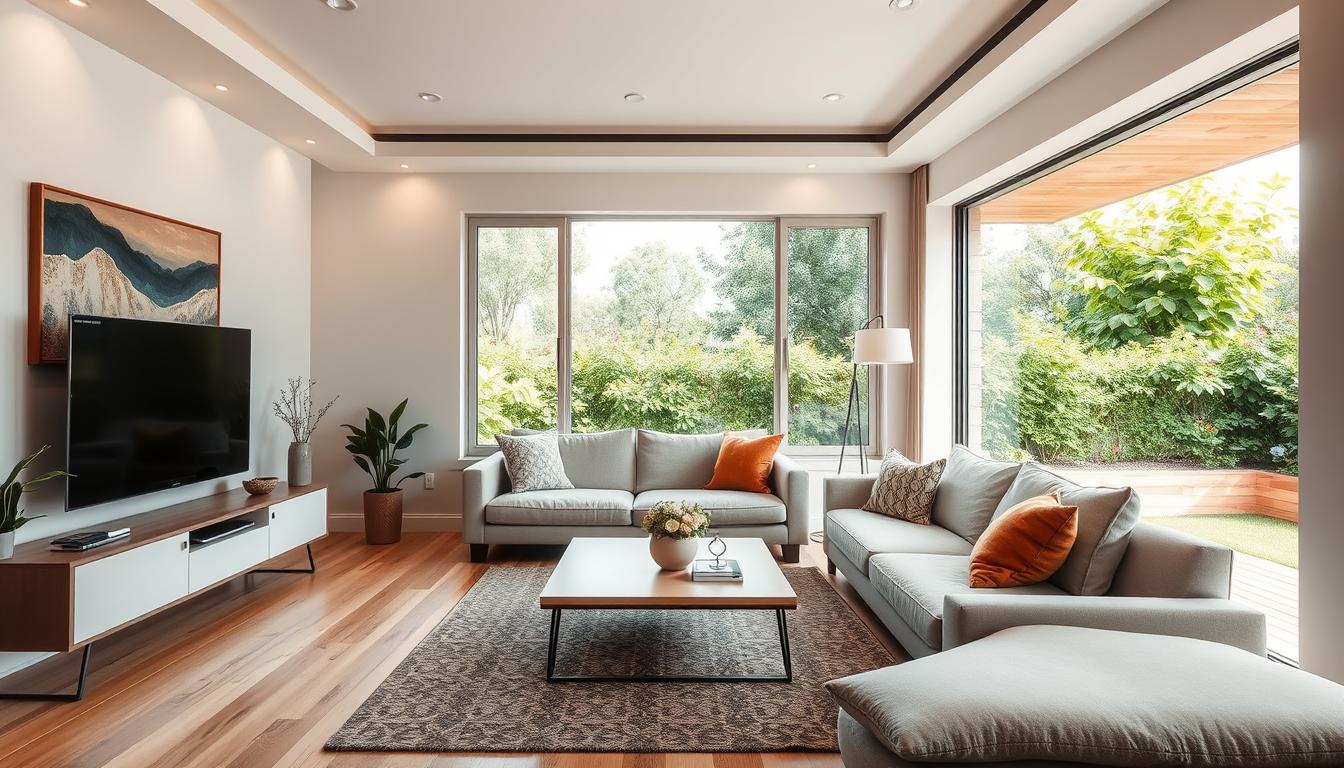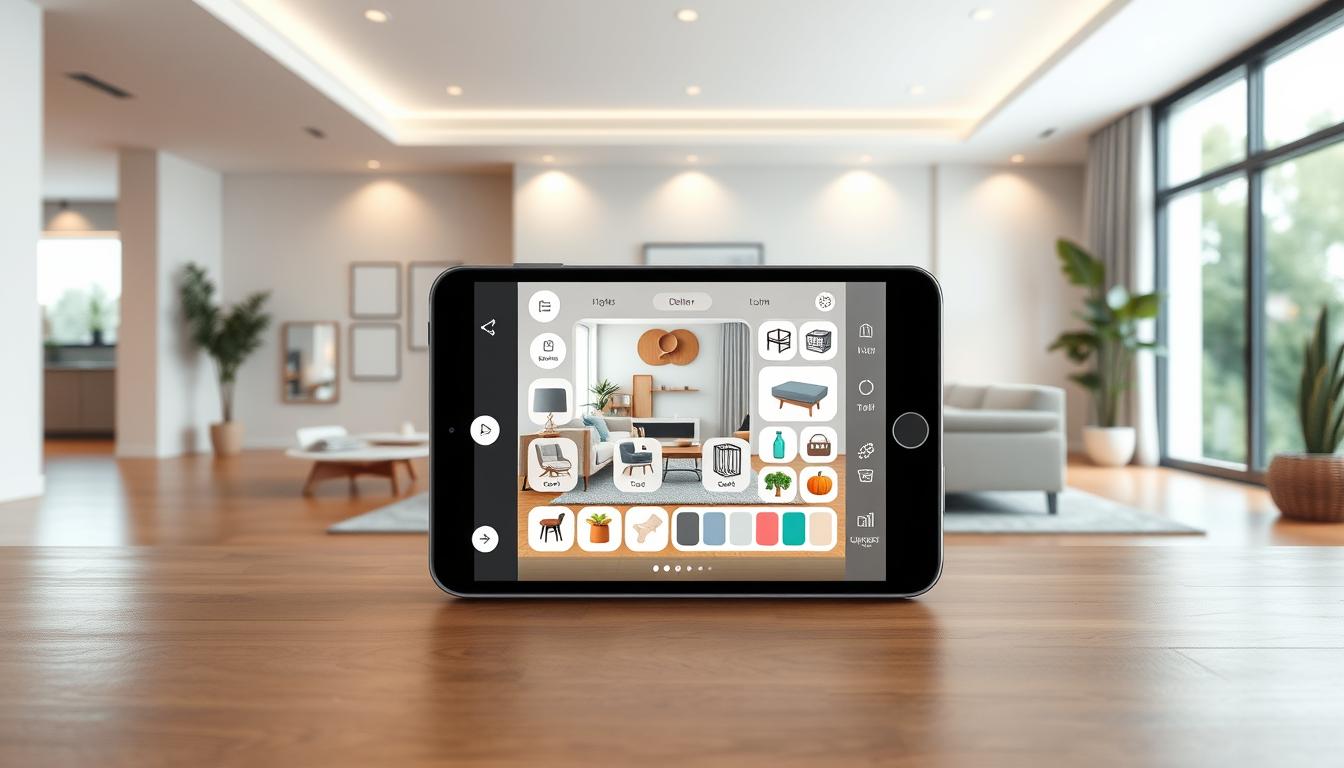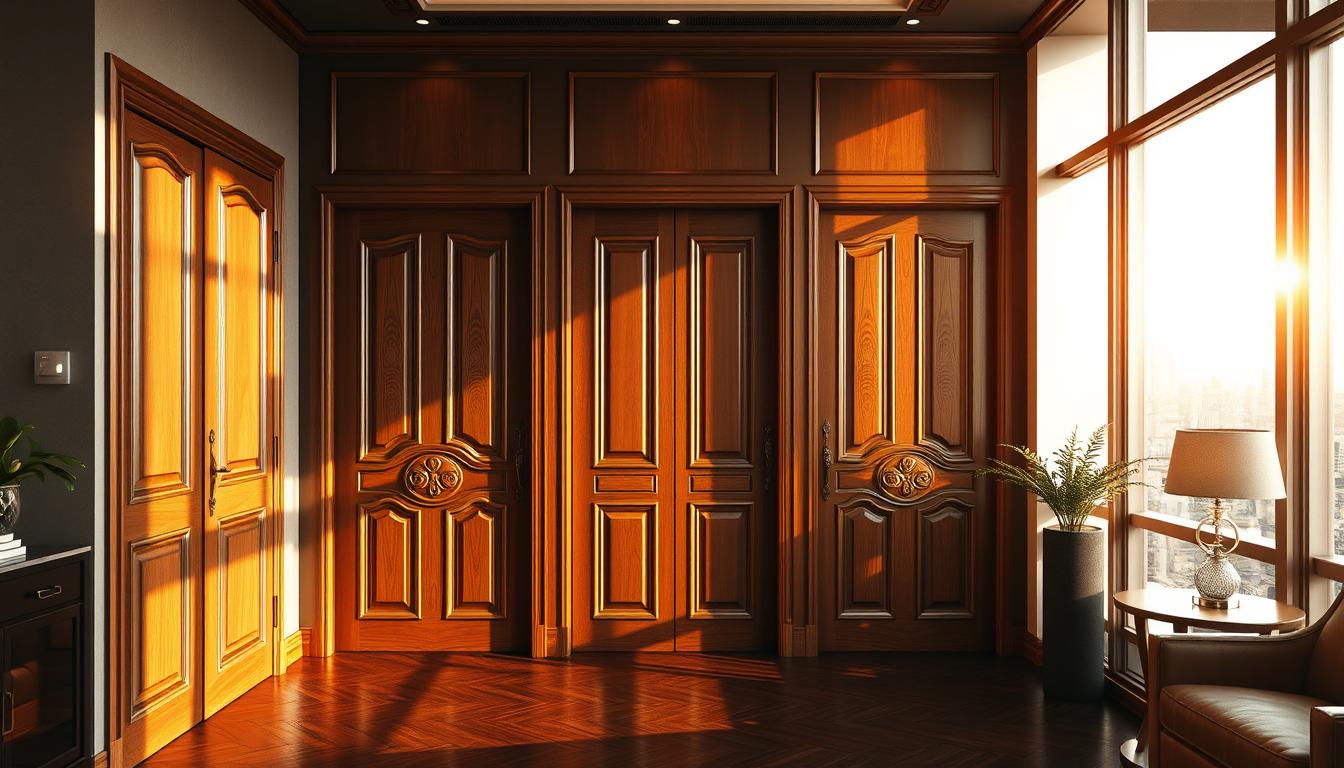Did you know that nearly 75% of Americans live in urban areas? Here, compact living spaces are the new standard.
Living in a small home can be a challenge. But, we can make it cozy and inviting. It’s all about creating a space that feels like home.
We know how important it is to make your small home your own. In this article, we’ll share tips and stylish interior ideas. These will help you use your space wisely.
Key Takeaways
- Discover how to maximize space in your small home
- Learn how to create a cozy atmosphere with stylish decor
- Explore practical tips for transforming your compact living space
- Find inspiration for making the most of your small home’s potential
- Get ready to turn your small home into a welcoming oasis
Embracing Minimalism for Space Efficiency
Minimalism is a smart way to make the most of small spaces. It helps us create homes that look bigger and feel more organized.
Minimalism isn’t just about getting rid of stuff. It’s a way of designing that focuses on simplicity and usefulness. It lets us enjoy our living space more by removing things we don’t need.
Understanding Minimalism
At its heart, minimalism is about living with purpose. It means choosing what we own carefully, keeping only things that matter or make us happy. In small homes, minimalism is key to avoiding clutter and making rooms feel bigger.
To live minimally, we must see it as more than just looks. Every item in a minimalist home should have a reason to be there. For more tips on designing small spaces, check out House Beautiful. They have lots of advice on making the most of small areas.
Tips for Decluttering
Decluttering is a big part of minimalism. Here are some tips to help you start:
- Begin with one area at a time to avoid feeling too much stress.
- Sort items into categories: keep, donate, sell, and throw away.
- Be strict about getting rid of things that don’t have a use anymore.
- Remember the 80/20 rule: you likely use only 20% of your stuff 80% of the time.
To see how decluttering works, let’s compare before and after:
| Before Decluttering | After Decluttering |
|---|---|
| Cluttered spaces | Open and airy spaces |
| Hard to find things | Easy to find what you need |
| Feeling stressed and overwhelmed | Feeling calm and less stressed |
By embracing minimalism and decluttering, we can make our small homes more efficient. They’ll feel bigger and more welcoming.
Choosing the Right Color Palette
The color palette you pick can really change how your small home feels. It can make it seem bigger or cozier. A good color scheme can also make your apartment look better and feel more welcoming.
When picking colors, think about the light in your home. Light colors can make a room look bigger and brighter. This is key in small homes where light might be scarce.
Light Colors to Brighten Spaces
Light colors on walls, ceilings, and trim can make your home feel bigger. Painting the ceiling and trim white is a smart move to brighten things up. It also helps light bounce around the room, saving on lighting costs.
Good light colors include soft whites, creamy neutrals, and pale pastels. You can use them alone or mix them for a unique look. For example, a soft white with a creamy neutral can add depth and interest.
Accent Walls for Depth
Light colors brighten a room, but accent walls add depth. A bold or contrasting color on one wall can make a statement. It draws the eye to that area.
When picking an accent wall, think about your home’s colors and style. Choose a color that complements your decor and adds personality. A bold red or navy blue can be dramatic, while a softer color can be subtle.
Light colors and accent walls together make a great color scheme. They enhance your small home’s feel and create a cozy atmosphere. It’s perfect for relaxing and enjoying your space.
Clever Furniture Solutions
Clever furniture solutions unlock the full potential of small living spaces. The right pieces help us use space efficiently without losing style or comfort.
Multi-Functional Furniture
Multi-functional furniture is key for small homes. Items like Murphy beds or custom sofas that do more than one thing make rooms more useful. For example, a sofa bed can be a place to sit during the day and sleep at night.
A storage ottoman is another great choice. It can be a coffee table, extra seating, and storage all at once. This kind of furniture saves space and keeps homes tidy, making them feel bigger and more organized.
Foldable and Stackable Options
Foldable and stackable furniture offers great flexibility. Items like foldable tables and chairs can be tucked away when not needed, saving floor space. Stackable chairs and stools can be stored in corners or against walls, ready to use when needed.
“The ability to adapt and change the layout of a room with ease is a hallmark of well-designed small spaces.” – Design Expert
With foldable and stackable furniture, we can change our living spaces easily. This makes our homes more versatile and useful for different needs and occasions.
By using these smart furniture solutions, we can have a spacious, organized, and stylish home, even in the smallest spaces.
Utilizing Vertical Space
Vertical space is key in small homes. It helps with storage and adds style. By using our ceiling height, we can make our homes feel bigger and more organized.
Shelving Ideas for Storage
Shelving is a smart way to use vertical space. It keeps books, decorations, and kitchen items off the floor. Wall-mounted shelves or adjustable freestanding units are great options.
Floating shelves are perfect for adding storage without taking up much space. They work well in kitchens, living rooms, and bedrooms. Shelves with baskets or bins also help keep things tidy.
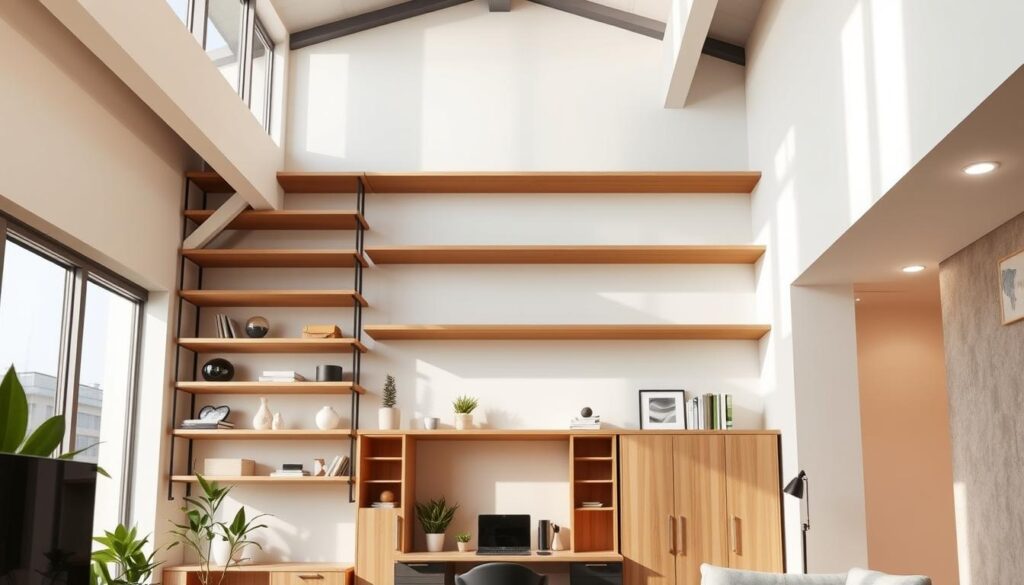
Tall Furniture to Draw the Eye Upward
Tall furniture, like bookcases and wardrobes, offers lots of storage. It also makes ceilings seem higher. Choose furniture that fits the room and ceiling size well.
A tall, narrow bookcase is great for small living rooms. It stores books and decorations while making the ceiling look higher. A tall wardrobe in a bedroom keeps clothes and linens organized, making the room feel bigger.
For more ideas on vertical storage, check out this blog. It’s full of inspiration for maximizing storage in small homes.
| Storage Solution | Description | Benefits |
|---|---|---|
| Floating Shelves | Wall-mounted shelves for displaying items or storing essentials. | Space-saving, easy to install, versatile. |
| Tall Bookcases | Freestanding or wall-mounted units for storing books and decor. | Ample storage, draws the eye upward, stylish. |
| Wall-Mounted Baskets | Baskets attached to the wall for storing small items. | Keeps clutter at bay, easy to access, decorative. |
The Power of Mirrors
Mirrors are a great tool for making small spaces look bigger. They reflect light and images, making rooms seem more open and airy.
Creating Illusions of Space
Mirrors reflect light and the area around them, making rooms seem deeper and wider. Strategic placement is crucial for this effect. For example, a mirror opposite a window can bounce natural light into the room, making it brighter and more spacious.
Also, mirrors can make a room feel larger by showing what’s outside. This trick not only makes the space feel bigger but also adds elegance to the room.
Creative Placement Tips
Here are some creative placement tips for mirrors in small homes:
- Put a big mirror above a sofa or fireplace to make the wall look bigger.
- Use a mirror to show off a beautiful view, bringing the outdoors inside.
- Place a mirror opposite a window to reflect natural light and brighten the room.
- Hang a mirror in a narrow hallway to make it seem wider.
By using mirrors wisely in your design, you can make your small home feel bigger and more welcoming.
Smart Lighting Choices
Lighting plays a big role in making small homes look bigger. “Good lighting is crucial for creating a sense of space,” say interior design experts. We’ll look at how to use lighting wisely in small homes.
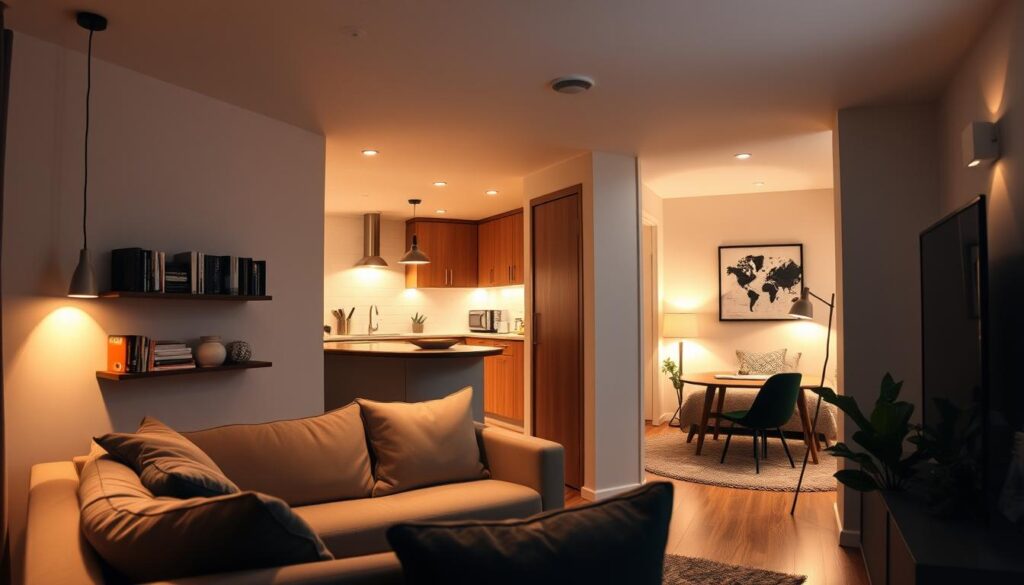
Layered Lighting Techniques
Layered lighting uses different light sources to make a space look good and work well. This includes:
- Ambient lighting for overall illumination
- Task lighting for specific tasks like reading or cooking
- Accent lighting to highlight decorative features
Using these different lights, we can add depth and make small spaces seem bigger.
Selecting Fixtures for Small Spaces
Choosing the right lighting for small homes is key. Slimline lights are great because they light up the area well without taking up too much space.
“The key to effective lighting in small spaces is to choose fixtures that are proportionate to the size of the room.” – Lighting Design Expert
Think about the light’s color too. Warm white light makes a space cozy. Cool white light makes it feel more open.
Creative Room Dividers
Small homes need smart ways to divide spaces. That’s where creative room dividers come in. They’re not just useful; they also make your home look better.
Using Curtains and Screens
Curtains and screens are great for dividing spaces in small homes. They can turn a corner into a cozy reading spot or separate a home office. Curtains come in many materials, patterns, and colors to match your decor. Screens offer a clear division and can be simple or fancy, depending on what you like.
Bookcases as Dividers
Bookcases are perfect for storing books and dividing rooms. They help keep your home tidy while creating separate areas. A bookcase divider is great for dividing a living room from a dining area. You can pick from many styles, from modern to traditional, to match your home’s look.
| Divider Type | Benefits | Best Use |
|---|---|---|
| Curtains | Easy to install, versatile, softens the space | Creating a cozy atmosphere, separating areas without blocking light |
| Screens | Portable, decorative, provides clear division | Dividing larger spaces, adding a decorative element |
| Bookcases | Storage, structural division, customizable | Separating living and dining areas, adding storage |
Adding creative room dividers to your small home design can make it more functional and beautiful. Whether you pick curtains, screens, or bookcases, the right divider can change how your home feels and works.
Outdoor Spaces: Expanding Your Home
Small homes can greatly benefit from well-designed outdoor spaces. These areas help create a seamless transition between indoors and outdoors. By using these spaces wisely, homeowners can expand their living area and improve their quality of life.
Designing Small Patios and Balconies
Even the smallest patios and balconies can be turned into inviting spaces. Multi-functional furniture is essential, like storage ottomans or foldable tables and chairs. These items can be easily stored when not in use. Adding vertical gardening also maximizes space and brings in greenery.
Here are some ideas for small patios and balconies:
- Choose compact furniture that serves more than one purpose
- Add plants and greenery to improve the ambiance
- Install outdoor lighting to use the space in the evening
Indoor-Outdoor Flow
Creating a seamless indoor-outdoor flow is key for small homes. This can be done with large sliding glass doors or atelier-style windows. These features connect rooms to the outdoors, making the home feel larger.
Here are ways to achieve an indoor-outdoor flow:
- Install large windows or sliding doors to connect spaces
- Use the same flooring indoors and outdoors for continuity
- Add outdoor heating or cooling to use outdoor spaces all year
By using these strategies, homeowners can maximize their outdoor spaces. This effectively expands their home’s living area and improves their interior ideas for small homes. Smart storage solutions for small homes can also optimize living space, both indoors and outdoors.
Personalizing Your Style
To make a small space feel like home, adding personal touches is key. We’ll look at how to do this with artwork and decorative items.
Incorporating Artwork in Small Spaces
Artwork can bring personality to your small home. Pick pieces that fit the room’s size. A big piece can stand out, while smaller ones can form a gallery wall.
Choose artwork that matches your space’s colors. This keeps the look cohesive and avoids clutter. It’s better to have a few standout pieces than many.
Choosing Decorative Accessories Wisely
Decorative items can make your small home special, but choose them carefully. Go for items that are useful or meaningful. A vintage vase adds elegance, while a family heirloom warms the space.
When decorating small spaces, balance looks and function. Use items like storage ottomans or decorative baskets. They keep things tidy while adding to the decor.
By carefully picking artwork and accessories, you can make your small home truly yours. This approach makes your space not only look good but also feel welcoming and cozy.
Incorporating Plants into Design
Plants can make your small home feel more welcoming. They add a touch of nature indoors. It’s not just about looks; it’s about making your home cozy and lived-in.
Finding the right planters for small spaces can be a challenge. Space-saving planters are a great solution. They come in wall-mounted and hanging baskets, saving space and keeping floors clear.
Creative Planters for Small Spaces
Choosing planters creatively can help. Use vertical planters on walls or in corners to save space. Hanging planters from the ceiling also save floor space and add decor.
| Planter Type | Space-Saving Benefit | Aesthetic Appeal |
|---|---|---|
| Wall-Mounted Planters | Frees up floor space | Modern, sleek look |
| Hanging Planters | Utilizes ceiling space | Adds a decorative touch |
| Vertical Planters | Maximizes corner or wall space | Unique, layered look |
Low-Maintenance Plant Options
For beginners or busy people, low-maintenance plants are best. Succulents and air plants are stylish and easy to care for. They do well indoors and need little water, perfect for apartments.
Adding plants to your home is more than just decor. It’s about making your space cozy and welcoming. Whether you’re new to plants or a seasoned enthusiast, there’s a lot to explore in your small home.
Making the Most of Unexpected Areas
In small homes, every corner is important. We can make our space bigger by using hidden spots for storage and more. This way, our homes stay tidy and look great.
Optimizing Under-Stairs Space
The area under the stairs is often ignored. But, we can turn it into useful space with clever furniture. For example, custom shelves or cabinets can hold linens, cleaning stuff, or even a desk.
Utilizing Hidden Nooks
Even small, hidden spots can be used for storage or as eye-catching features. A secret alcove can become a cozy reading spot or a place to show off your favorite things. This keeps our homes neat and adds charm.
By using these creative ideas, we can make our small homes work better. We get a tidy, useful living area.

